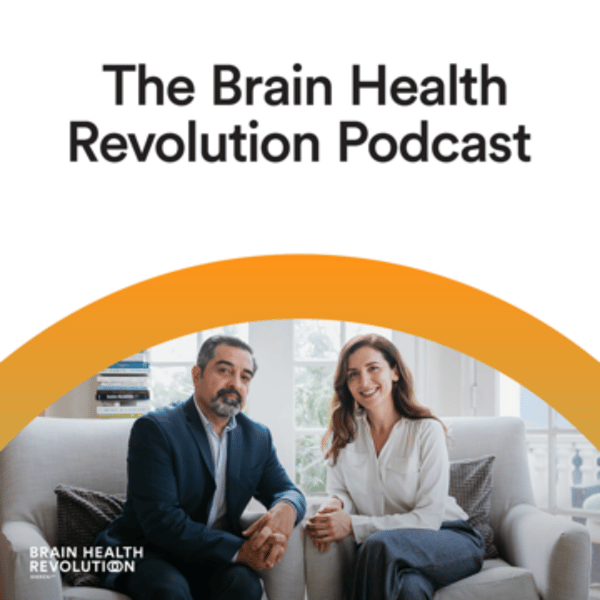Beyond Heartburn: Probing the Association Between Proton Pump Inhibitor and Dementia
The Brain Health Revolution Podcast
Dean and Ayesha Sherzai
4.8 • 604 Ratings
🗓️ 1 September 2023
⏱️ 43 minutes
🧾️ Download transcript
Summary
In this episode In this illuminating episode, we dive deep into the world of proton pump inhibitors (PPIs), commonly prescribed medications for heartburn and acid reflux. While these drugs have brought relief to millions worldwide, recent studies have begun to uncover potential links between PPI use and an increased risk of dementia. We explore the mechanisms that might underlie this association, the clinical implications for patients, and the broader question of how seemingly unrelated conditions might be connected at a molecular level. Whether you're a healthcare professional, a patient on PPIs, or simply someone curious about the intricate web of human health, this episode promises to offer fresh insights into a hotly debated area of medicine.
References:
Main papers disucssed in this episode:
- Northuis, Carin, et al. "Cumulative Use of Proton Pump Inhibitors and Risk of Dementia: The Atherosclerosis Risk in Communities Study." Neurology (2023).
- Gomm, Willy, et al. "Association of proton pump inhibitors with risk of dementia: a pharmacoepidemiological claims data analysis." JAMA neurology 73.4 (2016): 410-416.
https://jamanetwork.com/journals/jamaneurology/article-abstract/2487379
- Li, Min, et al. "Proton pump inhibitor use and risk of dementia: systematic review and meta-analysis." Medicine 98.7 (2019).
- Ortiz-Guerrero, Gloria, et al. "Proton pump inhibitors and dementia: physiopathological mechanisms and clinical consequences." Neural plasticity 2018 (2018).
- Wijarnpreecha, Karn, et al. "Proton pump inhibitors and risk of dementia." Annals of translational medicine 4.12 (2016).
- Haenisch, Britta, et al. "Risk of dementia in elderly patients with the use of proton pump inhibitors." European archives of psychiatry and clinical neuroscience 265 (2015): 419-428.
- Batchelor, Riley, et al. "Dementia, cognitive impairment and proton pump inhibitor therapy: a systematic review." Journal of gastroenterology and hepatology 32.8 (2017): 1426-1435.
- Gray, Shelly L., et al. "Proton pump inhibitor use and dementia risk: Prospective population‐based study." Journal of the American Geriatrics Society 66.2 (2018): 247-253.
- Ahn, Nayeon, et al. "Do proton pump inhibitors increase the risk of dementia? A systematic review, meta‐analysis and bias analysis." British Journal of Clinical Pharmacology 89.2 (2023): 602-616.
Follow us:
Join the NEURO Academy: NEUROacademy.com
Follow us on social media:
Instagram: The Brain Docs @thebraindocs
Facebook: The Brain Docs
TikTok: @thebraindocs
Website: TheBrainDocs.com
Transcript
Click on a timestamp to play from that location
| 0:00.0 | Welcome to the Brain Health Revolution podcast with your hosts, Aisha and Dean Cherzai. |
| 0:11.0 | We are neurologists, scientists, and authors of two best-selling books and parents to two amazing humans. |
| 0:18.0 | In a world where our understanding of brain health is constantly evolving, |
| 0:22.5 | join us as we unravel the mysteries of the human brain. Through captivating conversations, |
| 0:28.3 | insightful interviews, and thought-provoking discussions, we empower you with the knowledge and |
| 0:33.7 | tools to optimize brain function and prevent cognitive decline. |
| 0:38.0 | From nutrition, exercise, restorative sleep to building cognitive resilience and the impact |
| 0:44.0 | of technology, we explore the fascinating connections between brain health and other facets of our |
| 0:50.0 | lives. Get ready to unlock the potential of your brain and embrace a life of vitality. Thank you for |
| 0:57.0 | listening. Welcome to the Brain Health Revolution podcast. We hope you're doing well. Thank you so much for |
| 1:02.9 | joining us today. The topic of today's discussion is proton pump inhibitor and its relationship with |
| 1:10.1 | risk of dementia. So this is a very interesting topic. |
| 1:14.9 | Why is that interesting? Because so many people, especially in Western countries, use proton pump |
| 1:22.5 | inhibitors or these are medications that are acid blockers or medications that are used for gastric esophageal |
| 1:30.0 | reflux disease or GERD as it's known. |
| 1:32.7 | Yeah, I mean, in the last decade or so, we've become aware of the interaction of the |
| 1:38.5 | GI system and our health in general, whether it's immunity, whether it's the brain, its effect on the brain, |
| 1:46.3 | whether it's nutrient absorption, whether it's long-term diseases, like even immunological diseases |
| 1:53.1 | are rheumatoid arthritis in weird ways and thyroid and thyroid and so many other diseases |
| 1:58.7 | in indirect and direct ways being linked to the GI system. |
| 2:02.6 | And it makes sense. |
| 2:03.4 | It's the ultimate interface between the outside and the inside, and it's right there. |
... |
Please login to see the full transcript.
Disclaimer: The podcast and artwork embedded on this page are from Dean and Ayesha Sherzai, and are the property of its owner and not affiliated with or endorsed by Tapesearch.
Generated transcripts are the property of Dean and Ayesha Sherzai and are distributed freely under the Fair Use doctrine. Transcripts generated by Tapesearch are not guaranteed to be accurate.
Copyright © Tapesearch 2025.

